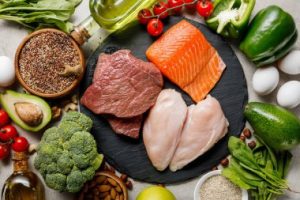
Can You Lose Weight On Keto Without Exercise (8 Important Facts)
Can you lose weight on keto without exercise? The ketogenic diet has gained popularity for its potential to help people shed pounds, but many wonder if physical activity is necessary for effective weight loss on this low-carb, high-fat regimen. Losing weight often conjures images of intense workouts and rigid exercise routines, but the ketogenic diet offers a different path.
Imagine shedding pounds while savoring rich, satisfying foods without stepping foot in a gym. This low-carb, high-fat diet focuses on shifting your body into a state of ketosis, where it burns fat for fuel instead of carbohydrates. While exercise can enhance overall health, the keto diet has proven effective in promoting weight loss on its own by curbing appetite and accelerating fat metabolism. Explore how you can achieve your weight loss goals through keto’s innovative approach, even without hitting the treadmill.

Can You Lose Weight On Keto Without Exercise
Yes, you can lose weight on a keto diet without exercise. The ketogenic diet primarily focuses on consuming high-fat, moderate-protein, and low-carbohydrate foods, which shifts the body’s metabolism from burning carbohydrates to burning fat for energy. This metabolic state, known as ketosis, can lead to significant weight loss even in the absence of physical activity. While exercise has many health benefits, it is not a strict requirement for losing weight on a keto diet. However, individual results can vary based on factors such as adherence to the diet and metabolic rate.
Understanding the Ketogenic Diet
The ketogenic diet is a low-carb, high-fat diet that alters your metabolism to burn fat for fuel instead of carbohydrates. By drastically reducing carbohydrate intake and increasing fat consumption, the body enters a state called ketosis. This state encourages the body to use stored fat as its primary energy source. Achieving ketosis can take several days, during which the body transitions from using glucose to using ketones, which are produced from fat breakdown.
How Keto Promotes Weight Loss Without Exercise
One of the primary reasons people experience weight loss on the keto diet is because it significantly reduces insulin levels. Insulin is a hormone responsible for storing fat, and lower insulin levels can facilitate fat burning. The diet also naturally reduces appetite due to the satiating effect of fats, leading to a lower overall calorie intake. Without the need for exercise, many individuals find that they naturally consume fewer calories on keto, contributing to weight loss.
Common Challenges and Tips for Success
Adhering to the keto diet without exercise can be challenging, especially in the beginning. The keto flu refers to symptoms like fatigue, headache, and irritability that some people experience as their bodies adapt to ketosis. To overcome these challenges, it’s crucial to stay hydrated, maintain electrolyte balance, and ensure adequate nutrient intake. Planning meals and snacks that are rich in healthy fats like avocados, nuts, and olive oil can also help maintain satiety and ease the transition into ketosis.
Maximizing Weight Loss on Keto
While exercise is not required for weight loss on keto, incorporating it can enhance results and improve overall health. However, for those focusing solely on diet, it’s important to track macronutrient ratios to ensure they remain in ketosis. Using tools like food diaries or apps can help maintain the right balance of fats, proteins, and carbs. Additionally, intermittent fasting is a popular strategy that can accelerate weight loss by further optimizing the body’s fat-burning potential.
Understanding the Keto Diet
Macronutrient Composition
Understanding the keto diet involves exploring its unique macronutrient composition, which is designed to shift the body’s metabolism away from carbohydrates and toward fat as its primary energy source. The ketogenic diet typically comprises a high fat intake, accounting for about 70-80% of total daily calories. This significant fat consumption encourages the liver to produce ketones, which are then used by the body as an alternative fuel to glucose.
Protein intake on the keto diet is moderate, making up roughly 15-20% of daily calories. This moderate protein consumption is crucial because excessive protein can be converted into glucose through a process called gluconeogenesis, potentially disrupting ketosis. Therefore, maintaining protein at a moderate level ensures that the body remains in a ketogenic state while still supporting muscle maintenance and repair.
The most restrictive aspect of the keto diet is its carbohydrate intake, which is limited to just 5-10% of total calories. By drastically reducing carbohydrates, the body is deprived of its usual source of energy, glycogen, prompting the switch to burning fat. This low-carb approach is essential for entering and maintaining ketosis, a metabolic state where fat becomes the primary energy source.
Overall, the careful balance of high fats, moderate proteins, and low carbohydrates is fundamental to the ketogenic diet’s effectiveness in promoting weight loss, enhancing mental clarity, and providing sustained energy levels for many individuals. However, it’s important to note that the keto diet may not be suitable for everyone, and those interested should consult with a healthcare professional to ensure it’s appropriate for their personal health needs.

Mechanism of Action
When carbohydrate intake is significantly reduced, the body depletes its glycogen stores and begins to convert fat into ketones in the liver, which then serve as an alternative fuel source for the brain and body. This process promotes fat burning as the body prioritizes breaking down fat for energy instead of carbohydrates.
One of the key benefits of this shift is its impact on insulin levels. Insulin, a hormone responsible for regulating blood sugar, typically rises when carbohydrates are consumed. By limiting carbohydrate intake, the keto diet helps stabilize blood sugar levels and lowers insulin secretion, which can be particularly beneficial for individuals with insulin resistance or type 2 diabetes. This reduction in insulin not only facilitates fat loss but also minimizes the storage of additional body fat.
Additionally, the keto diet has been associated with appetite suppression. The increased consumption of fats and moderate protein intake can lead to greater satiety, reducing hunger and the likelihood of overeating. This effect is partly due to the impact of ketones on hunger-regulating hormones like ghrelin, which is known to decrease appetite. Overall, the keto diet’s mechanism of action revolves around inducing ketosis to enhance fat burning, stabilize insulin levels, and suppress appetite, making it an effective strategy for weight loss and metabolic health improvement.
Weight Loss on the Keto Diet
Initial Weight Loss
The keto diet, short for the ketogenic diet, is a high-fat, low-carbohydrate eating plan that has gained popularity for its potential to facilitate rapid weight loss. One of the most notable aspects of weight loss on the keto diet is the initial drop in weight, often occurring within the first week or two of starting the diet. This initial weight loss is largely attributed to a reduction in water weight.
When you significantly reduce your carbohydrate intake, your body’s glycogen stores are depleted. Glycogen, which is stored in the liver and muscles, binds to water—about three grams of water per gram of glycogen. As glycogen is utilized for energy in the absence of carbohydrates, the water bound to it is also released, resulting in a noticeable reduction in weight due to water loss. This can be motivating for many individuals starting the diet, as the numbers on the scale can drop quickly.
However, it is important to understand that this initial weight loss is not the same as fat loss; rather, it reflects a shift in how the body stores energy and manages fluids. As the body continues to adapt to ketosis, the process by which it burns fat for fuel instead of carbohydrates, longer-term weight loss is more associated with fat reduction.
This transition can lead to sustainable weight loss when combined with a well-balanced ketogenic diet and healthy lifestyle choices, making the keto diet an attractive option for those looking to shed pounds and improve overall health. However, like any diet, the keto diet requires careful planning and consideration to ensure nutritional needs are met and to avoid potential pitfalls such as nutrient deficiencies or metabolic imbalances.
Sustained Weight Loss
In ketosis, the body shifts from using glucose as its primary energy source to burning fat, resulting in increased fat metabolism. This process helps in reducing body fat more efficiently compared to traditional high-carb diets. Additionally, the keto diet often leads to a natural reduction in appetite, which can result in a caloric deficit.
When carbohydrates are significantly reduced, the body produces ketones, which have been shown to suppress hunger hormones, making it easier for individuals to consume fewer calories without feeling deprived. This decrease in appetite, combined with the increased fat burning, supports sustained weight loss over time. Moreover, the higher intake of healthy fats and moderate protein helps maintain muscle mass while losing fat, which is crucial for a healthy metabolism. Many people on the keto diet report not only losing weight but also experiencing improved energy levels and mental clarity, making it a popular choice for those looking to achieve and maintain weight loss in a healthy and balanced manner.
Factors Influencing Weight Loss
Several factors influence weight loss on the keto diet, including individual metabolic rate, adherence to the diet, and the quality and type of fats consumed. Individual metabolic rate is a critical factor as it determines how efficiently one’s body can burn calories and utilize fat for energy. People with a higher metabolic rate may experience faster weight loss compared to those with a slower metabolism.
Adherence to the diet is another crucial factor; maintaining a consistent intake of low carbohydrates and high fats is essential for staying in ketosis and reaping the diet’s weight loss benefits. Deviating from the diet, even occasionally, can disrupt ketosis and slow progress.
Additionally, the quality and type of fats consumed play a significant role. Consuming healthy fats, such as those found in avocados, nuts, seeds, and olive oil, can support weight loss and overall health, whereas unhealthy trans fats and overly processed fats can hinder weight loss efforts and increase health risks.
Balancing macronutrients and focusing on nutrient-dense foods can enhance the effectiveness of the keto diet in promoting sustainable weight loss. Therefore, while the keto diet can be an effective strategy for weight loss, its success largely depends on individual factors and the ability to maintain dietary discipline and focus on quality nutrition.

The Role of Exercise in Weight Loss
Benefits of Exercise
Exercise plays a crucial role in weight loss, offering a range of benefits that contribute to effective and sustainable results. One of the primary benefits is enhanced calorie burning. Engaging in physical activities such as running, cycling, or strength training increases the body’s energy expenditure, which helps create a calorie deficit necessary for weight loss. When combined with a balanced diet, regular exercise can significantly accelerate the process of shedding unwanted pounds.
Additionally, exercise helps maintain and promote muscle growth, which is essential during weight loss. As we lose weight, we risk losing muscle mass along with fat. Incorporating strength training into a fitness routine ensures that we preserve lean muscle tissue while losing fat, resulting in a toned and healthy physique. Muscle maintenance is vital because muscle tissue burns more calories than fat tissue, even at rest, which helps prevent weight regain.
Furthermore, exercise improves metabolic rate. Regular physical activity boosts the body’s metabolism, increasing the number of calories burned throughout the day, even when not actively exercising. This is especially true for high-intensity workouts that create an afterburn effect, where the body continues to burn calories at an elevated rate post-exercise.
Besides these direct benefits, exercise also has positive effects on mental health, such as reducing stress and improving mood, which can indirectly support weight loss efforts by promoting healthier lifestyle choices. Overall, exercise is an indispensable component of a successful weight loss strategy, offering both immediate and long-term advantages for those looking to achieve and maintain a healthy weight.
Weight Loss Without Exercise
Exercise plays a significant role in weight loss by increasing the number of calories burned, improving metabolism, and promoting muscle growth. When combined with a healthy diet, exercise can help create a calorie deficit, which is essential for weight loss. However, it is possible to lose weight without exercise by focusing on a diet-induced calorie deficit, where the number of calories consumed is less than the number of calories the body needs to maintain its current weight. This can be achieved by eating nutrient-dense, low-calorie foods and controlling portion sizes. While diet alone can lead to weight loss, relying solely on calorie reduction without incorporating physical activity has some drawbacks.
One significant concern is the potential for muscle loss. When the body is in a calorie deficit, it may break down muscle tissue for energy, especially if protein intake is insufficient. This loss of muscle mass can slow metabolism since muscle tissue burns more calories at rest than fat tissue.
Maintaining muscle mass is crucial not only for a healthy metabolism but also for overall strength, functionality, and health. Exercise, particularly resistance training, helps preserve and build muscle during weight loss, ensuring that the weight lost comes primarily from fat rather than lean tissue. Additionally, exercise can improve cardiovascular health, increase energy levels, and enhance mood, making it an essential component of a healthy lifestyle. Therefore, while weight loss without exercise is possible through dietary changes alone, incorporating regular physical activity can help maintain muscle mass and improve overall health outcomes.
Challenges and Considerations
Plateaus in Weight Loss
The ketogenic (keto) diet, known for its high-fat, low-carbohydrate approach, presents several challenges and considerations for those pursuing weight loss. One of the most common challenges is hitting a plateau, where weight loss stalls despite continued adherence to the diet. This plateau often occurs because the body adapts to the changes in macronutrient intake, leading to a slower metabolism. The initial rapid weight loss on keto is primarily due to the depletion of glycogen stores and water loss, but as the body shifts into a state of ketosis, where it burns fat for fuel, the rate of weight loss can slow down.
Adaptation of metabolism, also known as metabolic adaptation, can make it increasingly difficult to lose weight as the body becomes more efficient at utilizing calories. To overcome plateaus, several strategies can be implemented. First, it’s essential to reassess calorie intake, as the body may require fewer calories as weight is lost. Incorporating intermittent fasting can also help, as it may boost metabolic rate and enhance fat burning.
Additionally, increasing physical activity, particularly resistance training, can help build muscle mass, which in turn can boost metabolism. Adjusting macronutrient ratios, such as increasing protein intake while slightly reducing fat intake, can also support continued weight loss by promoting satiety and preserving lean muscle mass. It’s crucial to maintain hydration and ensure adequate electrolyte intake to support metabolic processes and prevent fatigue.
Finally, tracking progress through measurements other than weight, such as body composition and clothing fit, can provide a more comprehensive view of success and keep motivation high. Patience and consistency are key, as the body may require time to adjust to these changes before breaking through a weight loss plateau.

Nutrient Deficiencies
A major concern with the keto diet is the potential lack of essential vitamins and minerals due to the exclusion of certain food groups like fruits, grains, and legumes, which are rich sources of nutrients. For instance, vitamins like vitamin C and certain B vitamins, as well as minerals such as magnesium and potassium, can be challenging to obtain in adequate amounts. This risk of deficiency can lead to symptoms such as fatigue, muscle cramps, and compromised immune function. To address these challenges, individuals on a ketogenic diet must prioritize a balanced intake of the foods they can consume, focusing on nutrient-dense, low-carb vegetables such as leafy greens, avocados, and nuts to help meet their nutritional needs.
Supplementation is often necessary to fill nutritional gaps. For example, a multivitamin can provide a broad range of nutrients, while specific supplement like magnesium, potassium, and omega-3 fatty acids can support overall health and well-being. However, it is crucial for individuals to consult with healthcare professionals before starting any supplementation regimen, as the requirements can vary widely based on personal health conditions, dietary restrictions, and goals.
Balancing the macronutrient focus of the keto diet with adequate micronutrient intake is essential for sustaining long-term health and achieving weight loss goals effectively and safely. Additionally, maintaining hydration and electrolyte balance is vital since the ketogenic diet can lead to increased water loss, further exacerbating the risk of deficiencies. Ultimately, a thoughtful approach that includes regular monitoring and adjustments can help overcome the challenges of nutrient deficiencies while supporting successful weight loss on the ketogenic diet.
Sustainability of the Keto Diet
Major challenge is the sustainability of the keto diet. Many people find it difficult to maintain the strict dietary restrictions in the long term, as it requires significant changes in eating habits and social dining, often necessitating meticulous meal planning and preparation. This can lead to feelings of deprivation and difficulty adhering to the diet over time, especially in social or family settings where carbohydrate-rich foods are prevalent. Additionally, the restrictive nature of the keto diet may not be practical or enjoyable for everyone, which can lead to issues with compliance and eventual abandonment of the diet.
Additionally, some individuals may experience side effects such as the “keto flu,” characterized by fatigue, headache, dizziness, nausea, and irritability during the initial phase of the diet as the body adapts to ketosis. For these reasons, individuals considering the keto diet should consult healthcare professionals to ensure it aligns with their health needs and goals and to mitigate potential risks through careful monitoring and nutritional supplementation.
Strategies for Successful Weight Loss on Keto Without Exercise
Dietary Adjustments
For those looking to achieve successful weight loss on keto without exercise, strategic dietary adjustments are essential. First and foremost, ensuring adequate protein intake is crucial. Protein helps maintain muscle mass, which is important for overall metabolism and preventing muscle loss during weight loss. Including high-quality sources of protein such as lean meats, eggs, and plant-based options like tofu or tempeh can help keep you feeling full and satisfied while supporting your body’s needs.
Additionally, incorporating healthy fats is a cornerstone of the keto diet. Healthy fats such as avocados, olive oil, nuts, and seeds provide energy, enhance satiety, and aid in the absorption of fat-soluble vitamins. It’s important to focus on whole, unprocessed sources of fats to avoid trans fats and other unhealthy options that can hinder weight loss.
Monitoring carbohydrate intake is another critical component of a successful keto diet. By drastically reducing carbohydrates, the body enters a state of ketosis, where it burns fat for fuel instead of glucose. This process can be enhanced by choosing low-carb vegetables like leafy greens, broccoli, and zucchini while avoiding starchy and sugary foods. Keeping carbohydrate intake typically below 20-50 grams per day can help maintain ketosis and facilitate weight loss.
To further support this process, meal planning and preparation are invaluable tools. Planning meals and snacks ahead of time can help prevent unintentional carb consumption and ensure that healthy keto-friendly options are always available. Staying hydrated and paying attention to electrolytes is also important on a keto diet, as the body can lose water and minerals more quickly. Incorporating foods rich in potassium, magnesium, and sodium can help maintain electrolyte balance.
Lastly, listening to your body’s hunger cues and practicing mindful eating can prevent overeating and support a healthy relationship with food. By focusing on these dietary strategies, it is possible to achieve successful weight loss on the keto diet without the need for exercise.

Lifestyle Modifications
Embarking on a keto diet for weight loss without incorporating exercise requires a multifaceted approach that focuses on lifestyle modifications to ensure success. One of the most crucial elements is stress management. Chronic stress can lead to hormonal imbalances, particularly an increase in cortisol, which can encourage fat storage and impede weight loss.
Techniques such as meditation, deep breathing exercises, and yoga can be effective in reducing stress levels. Another important factor is ensuring adequate sleep, as insufficient rest can disrupt the hormones that regulate hunger and satiety, leading to increased cravings and overeating. Aiming for 7-9 hours of quality sleep per night can support metabolic health and aid in weight loss efforts.
Additionally, practicing mindful eating can greatly enhance the effectiveness of the keto diet. This involves paying full attention to the experience of eating, savoring each bite, and listening to the body’s hunger and fullness cues. By eating slowly and without distractions, individuals can avoid overeating and make more conscious food choices that align with their dietary goals. Incorporating these strategies not only enhances the efficacy of the keto diet in promoting weight loss but also fosters a healthier, more balanced lifestyle.
Potential Benefits of Keto Without Exercise
Convenience and Accessibility
The ketogenic (keto) diet, which is a high-fat, low-carbohydrate eating plan, offers several potential benefits even without the addition of exercise. One of the main advantages is its convenience and accessibility. Unlike some diets that require special foods or supplements, the keto diet is based on readily available whole foods such as meat, fish, eggs, dairy, nuts, seeds, oils, and low-carb vegetables, making it accessible to a wide range of people. This accessibility can make it easier for individuals to adhere to the diet over the long term.
The keto diet may also be particularly beneficial for those with physical limitations that prevent regular exercise, such as individuals with certain disabilities, injuries, or chronic pain conditions. By focusing solely on dietary changes, individuals can still experience benefits like improved blood sugar control, increased energy levels, and potential weight loss, without needing to engage in physical activity.
The keto diet’s emphasis on reducing carbohydrate intake leads to a decrease in insulin levels, which can help the body burn stored fat more efficiently for energy. This process, known as ketosis, can result in weight loss and improved metabolic health markers, such as reduced triglyceride levels and improved HDL cholesterol. Additionally, many people report increased mental clarity and focus on the keto diet, likely due to the steady energy supply from ketones, which are produced when the body breaks down fat for fuel. These benefits make the keto diet a potentially effective option for those looking to improve their health through dietary changes alone.
Health Improvements
One of the most significant benefits of the keto diet is its impact on blood sugar regulation. By drastically reducing carbohydrate intake, the body shifts from using glucose as its primary energy source to using ketones, which are produced from fats. This shift can lead to more stable blood sugar levels, which is particularly beneficial for individuals with insulin resistance or type 2 diabetes, as it may help reduce the need for medications and lower the risk of diabetes-related complications.
Additionally, the keto diet is known for its appetite-suppressing effects, leading to a reduction in hunger and cravings. This can be attributed to the increased production of ketones and the higher satiety levels provided by fats and proteins compared to carbohydrates. As a result, individuals may find it easier to consume fewer calories without feeling deprived, which can contribute to weight loss and overall improved metabolic health.
Furthermore, the keto diet has been shown to potentially improve lipid profiles by increasing levels of high-density lipoprotein (HDL) cholesterol, often referred to as “good” cholesterol, and decreasing triglycerides. Some studies suggest that the diet may also lead to a reduction in low-density lipoprotein (LDL) cholesterol, although this effect can vary between individuals. These changes in lipid profiles can lower the risk of cardiovascular disease and promote heart health. Overall, while the keto diet’s effects can be enhanced by incorporating regular physical activity, many people may still experience significant health improvements through dietary changes alone, making it a compelling option for those seeking to improve their health and well-being without exercise.
Potential Drawbacks
Risk of Muscle Loss
The ketogenic diet, while popular for its potential to aid in weight loss and improve certain health markers, has several potential drawbacks that should be considered. One significant concern is the risk of muscle loss, particularly if the diet is not carefully managed. On a ketogenic diet, carbohydrates, the body’s primary source of energy, are severely restricted, leading to increased fat burning for fuel. However, without sufficient carbohydrates, the body may also begin to break down muscle tissue for energy, especially if dietary protein intake is inadequate. Protein is crucial for maintaining muscle mass, and a lack of it can lead to muscle wasting.
Additionally, some individuals on a ketogenic diet may not engage in regular exercise, which is essential for preserving muscle mass. Resistance training and other forms of exercise stimulate muscle growth and maintenance, and without these activities, there is a higher likelihood of muscle loss. Moreover, the initial phase of the ketogenic diet can involve a significant reduction in glycogen stores, which are essential for high-intensity workouts, potentially leading to decreased exercise performance and motivation.
Therefore, it is vital for individuals following a ketogenic diet to ensure they are consuming adequate amounts of high-quality protein and incorporating regular exercise into their routine to mitigate the risk of muscle loss and support overall health and well-being. Balancing macronutrients and maintaining an active lifestyle can help counteract these potential drawbacks, allowing individuals to reap the benefits of the ketogenic diet while minimizing negative impacts on muscle mass and physical fitness.
Decreased Metabolic Rate
The ketogenic diet, while popular for its potential weight loss benefits, comes with several potential drawbacks, particularly concerning metabolic health. One significant concern is the potential for a decreased metabolic rate, which can occur as a result of muscle loss. On a ketogenic diet, the body enters a state of ketosis, where it burns fat for fuel instead of carbohydrates. While this can lead to fat loss, the diet may also lead to muscle loss if protein intake is not adequately managed.
Muscle tissue is metabolically active, meaning it requires more energy to maintain than fat tissue. Therefore, when muscle mass decreases, the overall metabolic rate can also decrease, making it harder to maintain weight loss in the long term. This decrease in metabolism can be particularly pronounced if the diet is not accompanied by resistance training, which helps preserve muscle mass.
Additionally, a lower metabolic rate can lead to decreased energy levels and reduced ability to engage in physical activities, which are essential for overall health and well-being. To counteract these effects and maintain metabolic health while on a ketogenic diet, it is crucial to incorporate strategies that preserve muscle mass. These include consuming adequate protein, engaging in regular resistance and strength training exercises, and ensuring proper calorie intake to meet energy needs.
Furthermore, gradually transitioning into and out of the ketogenic diet can help mitigate muscle loss and metabolic slowdown by giving the body time to adjust to different energy sources. It is also beneficial to periodically reintroduce carbohydrates, especially around workout times, to support muscle maintenance and prevent metabolic downregulation. Overall, while the ketogenic diet can be effective for weight loss, it requires careful planning and management to avoid adverse effects on metabolism and muscle mass.
FAQs: Can You Lose Weight On Keto Without Exercise
Q1. Can I lose weight on a keto diet without exercising?
A. Yes, you can lose weight on a keto diet without exercising. The keto diet focuses on reducing carbohydrate intake and increasing fat consumption, which puts your body in a state of ketosis. In ketosis, your body burns fat for energy, which can lead to weight loss even without exercise.
Q2. How does the keto diet promote weight loss?
The keto diet promotes weight loss by shifting the body’s primary fuel source from carbohydrates to fat. When you consume fewer carbs, your insulin levels decrease, allowing your body to access and burn stored fat more efficiently. This process can help reduce body fat and support weight loss.
Q3. How much weight can I expect to lose on keto without exercise?
A. Weight loss on a keto diet varies for each individual and depends on factors such as starting weight, metabolism, adherence to the diet, and overall calorie intake. Some people may lose several pounds in the first week due to water loss and continue to lose 1-2 pounds per week thereafter.
Q4. Do I need to count calories on a keto diet if I’m not exercising?
A. While the keto diet doesn’t require strict calorie counting, being mindful of your overall calorie intake can help optimize weight loss. Consuming too many calories, even from keto-friendly foods, can hinder weight loss progress. Focusing on portion sizes and listening to your body’s hunger cues can be beneficial.
Q5. What foods should I eat to lose weight on keto without exercise?
A. To lose weight on keto without exercise, focus on eating high-quality, whole foods such as:
- Healthy fats (avocados, nuts, seeds, olive oil)
- Moderate protein (meat, poultry, fish, eggs)
- Low-carb vegetables (leafy greens, broccoli, cauliflower)
- Limited dairy (cheese, butter, cream)
Avoid high-carb foods like bread, pasta, rice, and sugary snacks.
Q6. Can I drink alcohol on a keto diet and still lose weight?
A. Alcohol can be consumed in moderation on a keto diet, but it can slow down weight loss as the body prioritizes metabolizing alcohol over fat. Opt for low-carb options like dry wines or spirits mixed with sugar-free mixers to minimize its impact on ketosis.
Q7. How important is hydration on a keto diet without exercise?
A. Hydration is crucial on a keto diet, especially without exercise, as the body tends to lose water and electrolytes. Drinking plenty of water and replenishing electrolytes with foods like avocados, nuts, and leafy greens can help maintain energy levels and support weight loss.
Q8. Are there any risks to losing weight on keto without exercise?
A. While many people successfully lose weight on keto without exercise, it’s essential to consider overall health and nutrition. The keto diet may lead to nutrient deficiencies if not properly balanced. Consulting a healthcare professional before starting the diet is recommended to ensure it aligns with your health goals.
Q9. How can I maintain weight loss on keto after reaching my goal?
To maintain weight loss on keto, gradually increase your carb intake while monitoring your weight and body composition. Incorporating healthy habits like regular physical activity, mindful eating, and staying hydrated can help sustain weight loss and overall well-being.
Conclusion
In conclusion, it is indeed possible to lose weight on a ketogenic diet without exercise, as the diet emphasizes reducing carbohydrate intake and increasing fat consumption, which can lead to a state of ketosis. In ketosis, the body burns fat for fuel instead of carbohydrates, which can result in weight loss. Many individuals find success in losing weight on keto due to its ability to suppress appetite and enhance metabolic efficiency.
However, incorporating exercise can offer additional health benefits, such as improved cardiovascular health, increased muscle mass, and enhanced overall well-being. Ultimately, the effectiveness of the ketogenic diet for weight loss without exercise varies from person to person, and it is important to consider individual health conditions and lifestyle factors when choosing a weight loss strategy. Consulting with a healthcare professional before starting any new diet is advisable to ensure it aligns with personal health goals and needs.